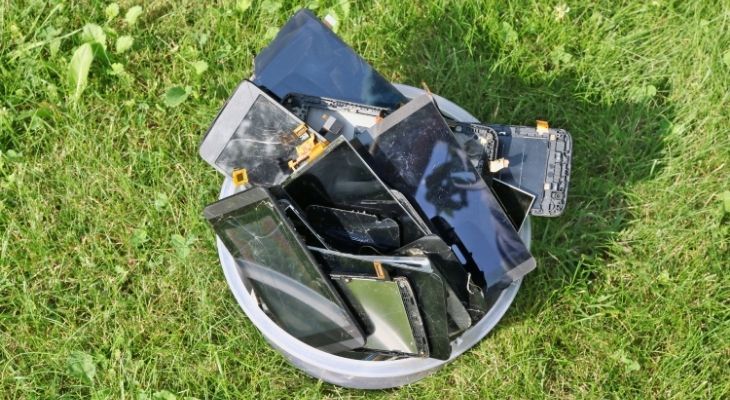Expanding the scope for e-waste
What would an expanded National Television and Computer Recycling Scheme (NTCRS) look like? What impacts would it have on the wider industry?
Warren Overton is CEO of Australia New Zealand Recycling Platform (ANZRP) and manages the TechCollect program – Australia’s leading e-waste collection channel operating under the NTCRS. Over the years, ANZRP has been a strong advocate for expanding the scope of the NTCRS to better achieve efficiencies and positive social and environmental outcomes.
In a few days time, Warren will be joining fellow industry experts and professionals at the AWRE Online Event and moderating a session on ‘E-Waste – Expanding the NTCRS’. Before the session, we spoke to Warren about what he envisions for an expanded NTCRS, the benefits and challenges that come with this, as well as little more background on the TechCollect program and the processes involved.
Q. To begin with, can you give us a bit of background on the TechCollect program and what is involved?
The TechCollect program provides Australian and New Zealand households and businesses with a free and easy way to responsibly dispose of and recycle their e-waste. With over 180,000 tonnes of e-waste being recycled since its inception, TechCollect is a leader in its field.
TechCollect has stringent processes in place to ensure all regulated product collected is recycled by a facility certified to best-practice standard AS/NZS 5377:2013 and in accordance with the standard. The program only partners with recyclers who operate to sound environmental and workplace health and safety standards and 100% of e-waste we collect is recycled in Australia (minimum first stage processing). With more than 280 free drop-off sites, TechCollect continuously exceeds the mandated 90% material recovery target, recovering valuable materials and diverting them from landfill and energy from waste for use in the manufacture of new goods: the essence of a circular economy.
Q. ANZRP-TechCollect operate under the NTCRS, what does this process look like?
Under the NTCRS, computer and TV manufactures and electronics importers (known as Liable Parties) are required to join and support a government approved co-regulatory arrangement such as the Australia and New Zealand Recycling Platform (ANZRP). Liable Parties then fund the free collection and recycling in accordance to their proportional liability. Established by ANZRP, TechCollect’s free drop-off and recycling services are proudly funded and supported by many of leading global computer and TV manufacturers, many of whom are leaders in corporate social responsibility and global product stewardship.
Q. When we talk of expanding the NTCRS, what does this look like to you? What kinds of changes would we see, what would the scheme look like?
Expanding the NTCRS would involve broadening the scope of the scheme to cover all electrical or electronic devices, ie. Any device that requites an electric current or electromagnetic field to operate, including batteries. The NTCRS expansion would see a nationally consistent approach to managing all WEEE products, rather than using the current mix of mandatory and voluntary schemes delivered at local, state and national level. This will ensure consistency, increase efficiency, reduce user confusion and make it easier for the Department for Agriculture, Water and the Environment through its regulator to monitor and enforce.
Q. What are the benefits and challenges that would come with an expanded NTCRS?
The benefits to an expanded NTCRS include a holistic and consistent approach within Australia to address the e-waste challenge. Environmental benefits include a reduction of greenhouse gas emissions, energy and water usage and particulate matter emissions and avoiding unnecessary landfill disposal of e-waste which can contain hazardous materials. Expansion to the NTCRS involves growth in the local recycling sector which would see greater employment opportunities, investment and innovation.
Challenges include addressing problematic WEEE streams: some products are more difficult to manage than others, such as those with high plastic content that may require specialist treatment, or those with low recovery rates for recyclable materials. There are also treatment capability gaps in Australia’s WEEE management system.
You’ll have the chance to hear more from Warren at the AWRE Online Event during his session on Thursday 26 November. He’ll be joined by fellow panelists Pascal Leroy of WEEE Forum, Monina De Vera from HP PPS Asia Pacific and David Kuhn of SSROC. Their varied experiences and industry insights will provide an educational and insightful discussion into the environmental, social and economic benefits of an expanded NTCRS.
The AWRE Online Event will run from 25-26 November 2020, giving the waste, recycling and resource recovery sector an online platform to re-connect with the industry. The program includes the chance to hear from 20+ industry professionals across 10 sessions, as well as product showcases and an online exhibition for your chance to discover a world of solutions. With live Q+A opportunities also available, the event provides an interactive and engaging experience no matter where you are in the world, all for free.
Haven’t registered yet? Simply click here to register free online.
-
Subscribe to the latest industry news, insights and AWRE updates.
- Subscribe

